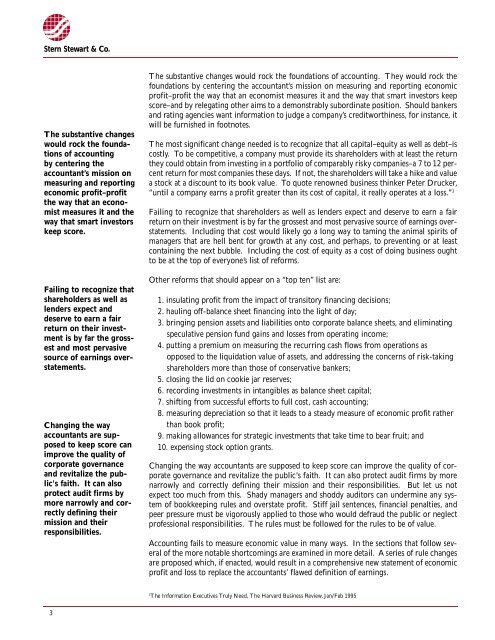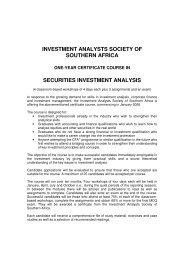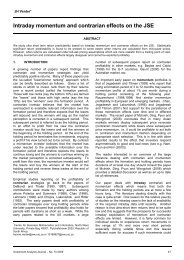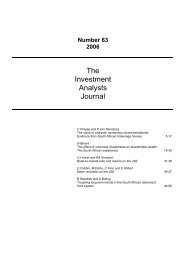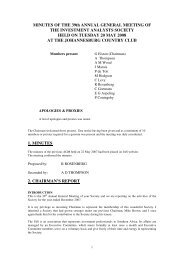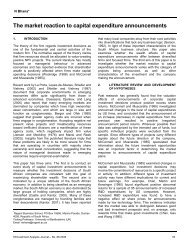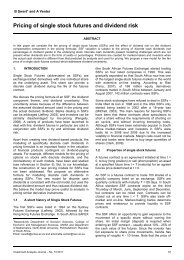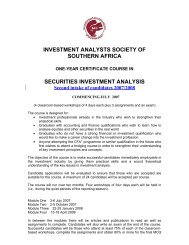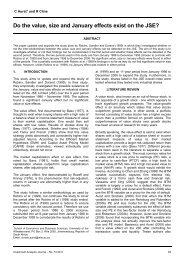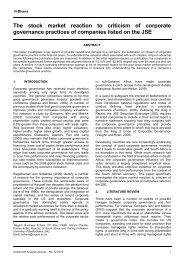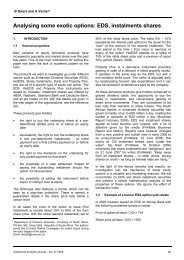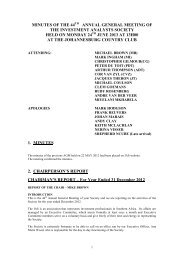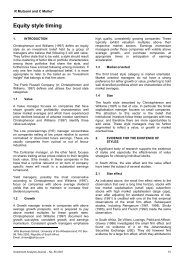Accounting is Broken - Investment Analysts Journal
Accounting is Broken - Investment Analysts Journal
Accounting is Broken - Investment Analysts Journal
Create successful ePaper yourself
Turn your PDF publications into a flip-book with our unique Google optimized e-Paper software.
Stern Stewart & Co.<br />
The substantive changes<br />
would rock the foundations<br />
of accounting<br />
by centering the<br />
a c c o u n t a n t ’s m<strong>is</strong>sion on<br />
measuring and re p o rt i n g<br />
economic pro f i t – p ro f i t<br />
the way that an econom<strong>is</strong>t<br />
measures it and the<br />
way that smart investors<br />
keep score .<br />
Failing to recognize that<br />
s h a reholders as well as<br />
lenders expect and<br />
d e s e rve to earn a fair<br />
re t u rn on their investment<br />
<strong>is</strong> by far the gro s s-<br />
est and most perv a s i v e<br />
s o u rce of earnings overs<br />
t a t e m e n t s .<br />
Changing the way<br />
accountants are supposed<br />
to keep score can<br />
i m p rove the quality of<br />
corporate govern a n c e<br />
and revitalize the public's<br />
faith. It can also<br />
p rotect audit firms by<br />
m o re narrowly and correctly<br />
defining their<br />
m<strong>is</strong>sion and their<br />
re s p o n s i b i l i t i e s .<br />
The substantive changes would rock the foundations of accounting. They would rock the<br />
foundations by centering the accountant’s m<strong>is</strong>sion on measuring and re p o rting economic<br />
p ro f i t – p rofit the way that an econom<strong>is</strong>t measures it and the way that smart investors keep<br />
s c o re–and by relegating other aims to a demonstrably subordinate position. Should bankers<br />
and rating agencies want information to judge a company’s cre d i t w o rthiness, for instance, it<br />
will be furn<strong>is</strong>hed in footnotes.<br />
The most significant change needed <strong>is</strong> to recognize that all capital–equity as well as debt–<strong>is</strong><br />
c o s t l y. To be competitive, a company must provide its shareholders with at least the re t u rn<br />
they could obtain from investing in a portfolio of comparably r<strong>is</strong>ky companies–a 7 to 12 percent<br />
re t u rn for most companies these days. If not, the shareholders will take a hike and value<br />
a stock at a d<strong>is</strong>count to its book value. To quote renowned business thinker Peter Dru c k e r,<br />
“until a company earns a profit greater than its cost of capital, it really operates at a loss.” 3<br />
Failing to recognize that shareholders as well as lenders expect and deserve to earn a fair<br />
re t u rn on their investment <strong>is</strong> by far the grossest and most pervasive source of earnings overstatements.<br />
Including that cost would likely go a long way to taming the animal spirits of<br />
managers that are hell bent for growth at any cost, and perhaps, to preventing or at least<br />
containing the next bubble. Including the cost of equity as a cost of doing business ought<br />
to be at the top of every o n e ’s l<strong>is</strong>t of re f o rm s .<br />
Other re f o rms that should appear on a “top ten” l<strong>is</strong>t are :<br />
1. insulating profit from the impact of transitory financing dec<strong>is</strong>ions;<br />
2. hauling off-balance sheet financing into the light of day;<br />
3. bringing pension assets and liabilities onto corporate balance sheets, and eliminating<br />
speculative pension fund gains and losses from operating income;<br />
4. putting a premium on measuring the re c u rring cash flows from operations as<br />
opposed to the liquidation value of assets, and addressing the concerns of r<strong>is</strong>k-taking<br />
s h a reholders more than those of conservative bankers;<br />
5. closing the lid on cookie jar re s e rv e s ;<br />
6. re c o rding investments in intangibles as balance sheet capital;<br />
7. shifting from successful eff o rts to full cost, cash accounting;<br />
8. measuring depreciation so that it leads to a steady measure of economic profit rather<br />
than book pro f i t ;<br />
9. making allowances for strategic investments that take time to bear fruit; and<br />
10. expensing stock option grants.<br />
Changing the way accountants are supposed to keep score can improve the quality of corporate<br />
governance and revitalize the public's faith. It can also protect audit firms by more<br />
n a rrowly and correctly defining their m<strong>is</strong>sion and their responsibilities. But let us not<br />
expect too much from th<strong>is</strong>. Shady managers and shoddy auditors can undermine any system<br />
of bookkeeping rules and overstate profit. Stiff jail sentences, financial penalties, and<br />
peer pre s s u re must be vigorously applied to those who would defraud the public or neglect<br />
p rofessional responsibilities. The rules must be followed for the rules to be of value.<br />
<strong>Accounting</strong> fails to measure economic value in many ways. In the sections that follow several<br />
of the more notable shortcomings are examined in more detail. A series of rule changes<br />
a re proposed which, if enacted, would result in a comprehensive new statement of economic<br />
p rofit and loss to replace the accountants’ flawed definition of earn i n g s .<br />
3<br />
The Information Executives Truly Need, The Harv a rd Business Review, Jan/Feb 1995<br />
3


